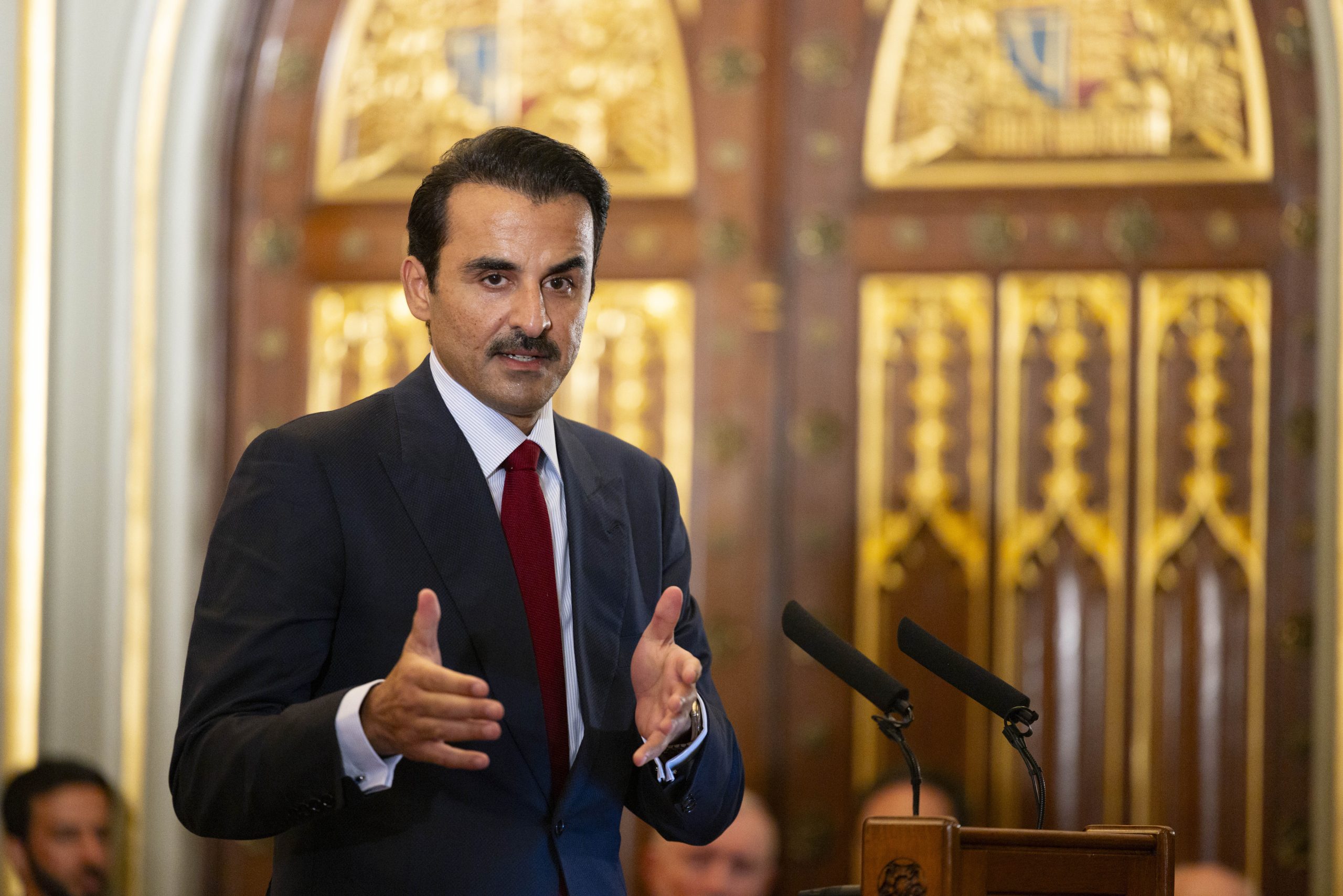
With reporting from Peter Kovessy
With several government agencies and large employers in Qatar cutting costs and laying off staff, an “alarming” number of expats are facing a double hit of not only losing their jobs, but also having their bank accounts frozen due to outstanding loans.
The measure is one taken by banks as a precaution, even if they’ve been receiving regular repayments. But this leaves some laid-off employees unable to access cash they need to pay for daily expenses.
Several people in this position recently spoke to Doha News and said they were also placed under a travel ban soon after being terminated from their jobs.
As deadlines loom to leave their company-provided accommodations, some said they are afraid that they will soon be homeless, or jailed after their accounts are overdrawn, because a bounced check is considered a criminal offense in Qatar.
Selling everything
To repay their loans quickly, many are working to borrow money from friends and family, and several are selling off their personal belongings so they afford basic necessities:
“I’ve sold everything in my house, except my washing machine and fridge,” Hamad Medical Corp. (HMC) paramedic Tim Reeber told Doha News. “We don’t even have a stove any more …I’ve even sold my couch.”
Qatar takes a hard line on expats and nationals who are unable to pay their debts, and gives banks considerable power to attempt to recoup loans from their customers’ accounts.
This can catch some residents off guard, especially laid-off expats who expected to be able to pay off their loan over the duration of their employment contract.
Salary delay
Reeber, 37, and fellow paramedic Kenneth Paton, 35, both said they were hired in late 2013 by HMC, which told them to quit their jobs and be ready to start work in Qatar in January 2014.

But after they resigned, HMC pushed back their start date to March and didn’t begin paying them until May, which means they went nearly five months without income.
To help bridge the gap until the men could receive their wages, HMC provided them with letters certifying their salaries and positions so that their banks could give them loans.
Both men took out large loans from Qatar National Bank (QNB) to pay off debts they had in the US, and to allow them to buy cars and furniture in Qatar.
So far, of the QR300,000 they each owe, they have managed to pay off around QR120,000, leaving them with a balance each of an estimated QR180,000.
Paton – a father of three children who live in the US – told Doha News that he’d used some of the money to save his house back home from foreclosure.
He said that he felt safe taking out such a large loan because his three-year contract was extendable, and he believed his job was stable.
Reeber, who has one child living in the US and a pregnant wife living with him in Qatar, said that he felt the same way:
“Maybe in hindsight I shouldn’t have taken the loan out. But it (being a paramedic) is a stable job, it’s not some flimsy non-essential job, so I thought I wasn’t going to lose it unless I actively did something wrong.
I thought it was secure, and I was paying the loan back on time and I never missed a payment. I was planning on making extra payments in my third year so I could pay it off early.”
Reeber added that he felt the bank had encouraged him to take out the maximum loan allowable.
“They said, you can have this amount based on your salary, so you can do more, and it’s cheap to do so,” he said.
Layoffs
Both Paton and Reeber were laid off in January as HMC culled more than 1,000 positions from its payroll. They were given two months’ notice and officially cease to be HMC employees on March 25.
The pair have launched a fundraising page to help them pay off their bank debts so that a travel ban placed upon them can be lifted.
Since being given notice, both Paton and Reeber’s salaries have been withheld by the bank to repay loans the men took out at the beginning of their employment.
Their bank accounts have also been frozen.

Additionally, a travel ban – imposed on them by their bank – has been in place since HMC notified QNB that the two men had been made redundant at the end of January.
Paton and Reeber both said they didn’t expect their employer to notify the bank of the termination so soon.
However, because employers are required to sign off on loans, they are also obligated to report terminations to the bank.
Paton said his bank told him on Feb. 2 that his account had been overdrawn.
“They called me in, froze my accounts and canceled my credit card too. I don’t know why my personal information was relayed to the bank.”
Neither QNB nor HMC have responded to requests for comment.
Temporary life
Paton and Reeber are far from the only expats to find themselves in this situation in Qatar.
Speaking to Doha News this week, an official at the Philippines Embassy in Qatar said at least 30 nationals have sought help since Qatar Petroleum starting laying off staff last year – a figure Deputy Head of Mission Gonaranao Musor called “alarming.”
Musor added that applying for a loan isn’t in itself an issue, but cautioned that expats should be “realistic” about whether they would be able to pay it back when they leave the country, as especially because that departure could come at any time.

“Working abroad is a temporary arrangement,” Musor said. “But once you start earning a high salary, you can get used to a new lifestyle that includes lots of shopping and traveling abroad and forget about saving for the future.”
However, some have previously argued that it is too easy for expats and nationals alike to take out loans in Qatar.
This is despite the fact that the Qatar Central Bank issued rules in 2011 (Circular No. 36/2011) to curb the number of people falling into debt by imposing lending limits on banks.
According to the QCB, the maximum allowable loan to an expat is QR400,000, for up to a loan length of four years. For Qataris, the amount is QR2 million, and they have a loan length of six years.

Additionally, repayments for expats must not be more than 50 percent of their monthly salary (75 percent for Qataris) and the interest rate charged must not be more than 1.5 percent above the QCB interest rate.
It appears that some financial institutions are tightening their lending requirements by temporarily banning loans to employees of organizations that are known to be down-sizing.
Speaking to Doha News, a bank source said:
“We usually receive a circular right after each wave of layoffs to tell us not to receive nor accept any loan applications from people who are employed by those workplaces” the source said.
“Those new policies won’t be announced at large, it’s just a thing banks are doing temporarily to be on the safe side.”
Options
According to Paton and Reeber, QNB suggested they should either find someone else in Qatar to take on their loan, or find another job.
However, HMC has not yet provided the men with a no-objection certificate (NOC) to allow them to switch employers.
Even if an NOC is offered, Paton said no one else in Qatar is hiring paramedics.

“I’m trained medical personnel. Where am I going to work?” he said.
Both men said that they have asked the US Embassy for help, but that they were told that the embassy could not get involved in civil matters, and that it would only assist them if they were arrested.
In a statement sent to Doha News, the US Embassy in Qatar said that it had been “in regular contact” with American citizens currently under travel restrictions:
“The Department of State takes seriously its obligation to assist U.S. citizens abroad, and stands ready to provide all appropriate consular services to U.S. citizens in need,” an embassy spokesman said, adding it has provided the individuals with a list of attorneys to consult.
Paton and Reeber are very critical of how HMC has handled their layoffs, arguing that giving them more warning, or paying them their salaries until the end of their contracts, would have helped them avoid their current predicament.
Reeber, meanwhile, said neither HMC or the bank is willing to help them:
“It got to the point where we were basically stonewalled by the corporation and by the bank. They dropped me like a bad habit. They’re refusing to talk to me.
I feel this situation infringes on people’s human rights. This is not how you should treat someone who moved to your country to work for you.”
Thoughts?







